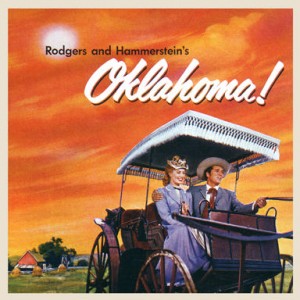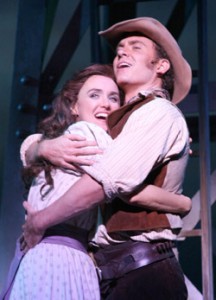In my civilian life, I spend a lot of time talking to people who are trying to decide what Broadway play or musical to see. After being told that scoring a last-minute ticket to Jersey Boys is well-nigh impossible, they frequently ask me which is the next ”best” show, as if there were no such thing as personal taste. Generally I deflect this question with some of my own, such as ”What have you seen before?” or ”Are you looking for something traditional or something new and hip?” (Of course, the second one uses the word ”hip,” one signals that one is anything but.) I attempt to communicate the range of options by grouping the shows into categories: rock musicals (Hair, Next to Normal), jukebox shows (Rock of Ages, Mamma Mia!), extravaganzas (Mary Poppins, The Phantom of the Opera). ”And if you’re looking for an old-fashioned classic,” I advise the anxious tourists, ”you might try West Side Story or South Pacific.” In response to their puzzled expressions, I will explain that these two revivals are products of the Golden Age of Broadway musicals, and that the latter was written by Rodgers and Hammerstein, easily the most successful composer-lyricist team of all time. Nine times out of ten, a glazed look will come over their faces, at which point I know my next line should be, ”If you like Elton John, you’ll love Billy Elliot!”
I can’t remember a time when I wasn’t in love with Broadway musicals. Even before I was old enough to attend them, I was bombarded in my own home by numbers from shows both celebrated and obscure. When the ”Saturday with Sinatra” radio program came on, as it did every week, my living room became a stage and I an interpretive dancer, performing to ”Luck be a Lady” from Guys and Dolls, ”I Get a Kick Out of You” from Anything Goes, or the devastating ”Soliloquy” from Carousel, another Rodgers & Hammerstein show. Perhaps it was that early influence, or the fact that I am actually the reincarnation of Cole Porter, that turned me into a musical theater junkie, but year after year, at birthdays and Christmas, my folks dutifully took me to show after show — Peter Pan, Annie, Cats, Dreamgirls, 42nd Street, The Mystery of Edwin Drood. I eventually started seeking out the cast albums of classic shows, like Kiss Me Kate and Camelot. As I approached maturity, I began to realize that Broadway was becoming more and more about spectacle and less and less about music; I had no interest in the bloated yet insubstantial Phantom or the banal pop hysterics of Miss Saigon. For better or worse, I had the rhythms, orchestrations, and lyrics of the Golden Age in my blood, and next to those, musicals based on dopey Hollywood comedies (yes, I’m talking about you, Legally Blonde) seemed like crimes against humanity. 
Amazingly, I made it through almost three decades of life without seeing the show that virtually everyone acknowledges as the harbinger of the musical’s cultural supremacy, Rodgers & Hammerstein’s Oklahoma! I vaguely remember that a small troupe of actors performed an extremely abridged version of it in my elementary school auditorium, and that we sang the title song and the ballad ”Oh, What a Beautiful Mornin’” during Friday assemblies. Somehow I had missed the movie as well. A co-worker’s husband was in the cast of the 2002 Broadway revival and she offered me comp tickets. I arrived at the Gershwin Theater and settled in, ready to be swept away by the tale of simple folk farming and falling in love on land stolen from the red man. I was not disappointed — especially when the hero, Curly, performed what might be the 1906 version of ”Greased Lightnin’,” ”The Surrey with the Fringe on Top.” Essentially, it’s a young man’s attempt to charm a headstrong young woman into ditching the town weirdo for him. He appeals to her vanity and her burgeoning sexuality, describing how fine they will look in this totally awesome ride, how much fun they will have together, and how romantic it will be as the moon rises and the stars come out. If this sounds like the corniest thing in the world, it may well be. But as Paul McCartney said of silly love songs, ”What’s wrong with that?” — especially when the silly song is so earnest, clever, and delightful.
 Those very qualities make ”Surrey with the Fringe on Top” incredibly easy to parody or mock. Remember how ridiculous Billy Crystal felt in When Harry Met Sally, when his ex-wife and her new boyfriend caught him singing ”Surrey” on a karaoke machine in a Sharper Image store? Those who watched David Lynch’s television masterpiece Twin Peaks will recall how creepy Leland Palmer started singing the song compulsively as he careened around town with a body in the trunk of his car — ”Chicks and ducks and geese better scurry,” indeed. But this show tune has also been covered by some of the coolest people ever to make music, including Miles Davis, Blossom Dearie, and Marlene Dietrich (in German!). Those who recoil from its folksiness or sneer at its sentimentality are really doing themselves a disservice. Though ”Surrey” is presented as the boast of a callow cowboy, it’s actually the creation of two brilliant artists whose mastery of their craft is surpassed by no one. Richard Rodgers’ playful melody is matched line for line by Oscar Hammerstein’s nimble lyrics, which show off their rhymes with as much pride as Curly takes in describing the titular vehicle: no fewer than six different words are rhymed with ”top.” As the song comes to a close, both the orchestra and the singer lower their volume, and Curly imagines that after a long night, ”…my baby’s a-sleepin’/Maybe got a dream worth a-keepin’.” Between the sweetness of the moment and the virtuosity of the line, I’m on the verge of a-weepin’.
Those very qualities make ”Surrey with the Fringe on Top” incredibly easy to parody or mock. Remember how ridiculous Billy Crystal felt in When Harry Met Sally, when his ex-wife and her new boyfriend caught him singing ”Surrey” on a karaoke machine in a Sharper Image store? Those who watched David Lynch’s television masterpiece Twin Peaks will recall how creepy Leland Palmer started singing the song compulsively as he careened around town with a body in the trunk of his car — ”Chicks and ducks and geese better scurry,” indeed. But this show tune has also been covered by some of the coolest people ever to make music, including Miles Davis, Blossom Dearie, and Marlene Dietrich (in German!). Those who recoil from its folksiness or sneer at its sentimentality are really doing themselves a disservice. Though ”Surrey” is presented as the boast of a callow cowboy, it’s actually the creation of two brilliant artists whose mastery of their craft is surpassed by no one. Richard Rodgers’ playful melody is matched line for line by Oscar Hammerstein’s nimble lyrics, which show off their rhymes with as much pride as Curly takes in describing the titular vehicle: no fewer than six different words are rhymed with ”top.” As the song comes to a close, both the orchestra and the singer lower their volume, and Curly imagines that after a long night, ”…my baby’s a-sleepin’/Maybe got a dream worth a-keepin’.” Between the sweetness of the moment and the virtuosity of the line, I’m on the verge of a-weepin’.
Look, I enjoy edgy, ironic entertainment as much as the next hypereducated Gen-X-er. I laughed my ass off at Observe and Report, and I have seen Rasputina and Northern State play live. But no woman or man can live on bitterness alone. For those seeking to reactivate a long dormant sense of romance or thaw out a frozen sincerity lobe, turn to the lullaby of Broadway. Go back in time, before simplicity was traded in for stupidity (yes, I’m talking about you, Jekyll and Hyde), and allow lyrics like ”Nosey pokes’ll peek thru’ their shutters and their eyes will pop” to turn you into a fully functioning human being again. It’s okay…you’re still a badass, and you are still allowed to go see American Idiot.

![Reblog this post [with Zemanta]](http://img.zemanta.com/reblog_e.png?x-id=ea2a75fb-d4bd-4ae3-b9f4-a7c3b8f704a3)



Comments